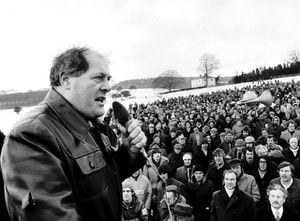‘Red Robbo’ ruined British Leyland
Re: The recent death of ‘Red Robbo’ Robinson at the age of 90.

Derek Robinson was a born agitator who created havoc by encouraging and leading full-blown strikes and walkouts at the drop of a hat often at a moment’s notice.
I worked at the Longbridge plant for many years and well remember on one occasion half a day’s production was lost by him leading a walk out because the ambient temperature in one of the car assembly buildings at Longbridge was a one degree lower than it should have been.
Those who are gushing with epithets by calling him ‘a stalwart of the trade union movements’ simply do not understand or do not accept what Robinson achieved. Far from protecting and improving the lot of the thousands of workers at Longbridge, and the myriad of those who worked at our suppliers throughout the Midlands, many of whom were small family businesses, he actually ruined British Leyland and cost thousands of his members their jobs.
In just 12 months, 1978/9, he presided over 520 stoppages – some lasting just a few hours. These constant stoppages in production resulted in shoddy and unreliable cars being made, which the buying public rightly turned away from, and signalled the beginning of the end for British Leyland.
The irony of it was he thought he was very popular and loved by those he was supposed to represent. Far from it. He finally met his match in Michael Edwardes, who sacked him unceremoniously soon after he took over as chief executive.
Robinson organised a sympathy strike in protest at his dismissal.
The Longbridge workers had had enough of him by then and only 600 supported him with a hefty 14,000 voting against striking.
The one positive result of all those years of strikes and disruption was it brought Margaret Thatcher to power, who legislated some sanity with the way trade unions worked, with the introduction of secret ballots before strikes were called.
Nick Psirides
Rubery





